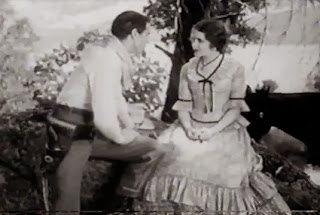Then I heard a
fellow greet my Virginian. He came happily out of a door, and made a pass with
his hand at the Virginian's hat. The Southerner avoided it, and I saw once more
the tiger undulation of body, and knew my escort was he of the rope and the
corral.
"How are
yu' Steve?" he said to the man. And in his tone I heard instantly old
friendship speaking. With Steve he would take and give familiarity.
Steve looked at
me, and looked away—and that was all. But it was enough. In no company had I
ever felt so much an outsider. Yet I liked the company, and wished that it
would like me.
"Just come
to town?" inquired Steve of the Virginian.
"Been here
since noon. Been waiting for the train."
"Going out
to-night?"
"I reckon
I'll pull out to-morro'."
"Dear
me," said I.
"But I
guess one of them will let yu' double up with him." Steve was enjoying
himself, I think. He had his saddle and blankets, and beds were nothing to him.
"Salesmen,
are they?" asked the Virginian.
"Two Jews
handling cigars, one American with consumption killer, and a Dutchman with
jew'lry."
The Virginian
set down my bag, and seemed to meditate. "I did want a bed to-night,"
he murmured gently.
"Well,"
Steve suggested, "the American looks like he washed the oftenest."
"That's of
no consequence to me," observed the Southerner.
"Guess
it'll be when yu' see 'em."
"Oh, I'm
meaning something different. I wanted a bed to myself."
"Then
you'll have to build one."
"Bet yu' I
have the Dutchman's."
"Take a man
that won't scare. Bet yu' drinks yu' can't have the American's."
"Go
yu'" said the Virginian. "I'll have his bed without any fuss. Drinks
for the crowd."
"I suppose
you have me beat," said Steve, grinning at him affectionately. "You're
such a son-of-a—— when you get down to work. Well, so long! I got to fix my
horse's hoofs."
I had expected
that the man would be struck down. He had used to the Virginian a term of
heaviest insult, I thought. I had marvelled to hear it come so unheralded from
Steve's friendly lips. And now I marvelled still more. Evidently he had meant
no harm by it, and evidently no offence had been taken. Used thus, this
language was plainly complimentary. I had stepped into a world new to me
indeed, and novelties were occurring with scarce any time to get breath between
them. As to where I should sleep, I had forgotten that problem altogether in my
curiosity. What was the Virginian going to do now? I began to know that the
quiet of this man was volcanic.
"Will you wash
first, sir?"
We were at the
door of the eating-house, and he set my bag inside. In my innocence I was
looking indoors for the washing arrangements.
"It's out
hyeh, seh," he informed me gravely, but with strong Southern accent.
Internal fun seemed often to heighten the local flavor of his speech. There
were other times when it had scarce any special accent or fault in grammar.
(Adapted to easier English)
Artículo relacionado
Recursos
en internet
El film incluía
la canción "Bury Me Not on the Lone Prairie", se la puede escuchar en
Youtube.
"Bury Me Not on the Lone Prairie" es una
canción folklórica del oeste. También conocida como "The Cowboy's
Lament", "The Dying Cowboy" y "Bury Me Out on the Lone
Prairie", la canción es considerada como la más famosa balada de vaqueros.
Basada en una canción de marineros, ha sido grabada por muchos artistas
incluyendo a Moe Bandy, Johnny Cash, Burl Ives, Tex Ritter, Roy Rogers y
William Elliott Whitmore. Una versión de la canción fue usada en el video juego
Red Dead Redemption, cantada por William Elliott Whitmore. La letra de esta
canción se remonta a principios del siglo 19.

No hay comentarios:
Publicar un comentario
Deja aquí tus mensajes, comentarios o críticas. Serán bienvenidos